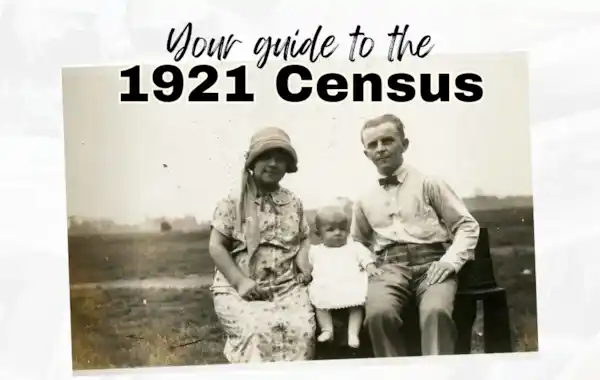15 January 2025
|
The 1921 Census for England, Wales and Scotland is available for family history research. Search it on Ancestry and Findmypast (for England and Wales) and on ScotlandsPeople. Find out how to get the most from this resource with our comprehensive guide to the 1921 Census.
Providing detailed demographic data, the 1921 Census highlights family structures, occupations, and residential locations, giving a vital insight into this remarkable period in our history.
Get your free 1921 Census Research Toolkit
Sign up for the free Family Tree newsletter, and we’ll send you a link to our free census kit featuring:
- 1921 Census fact file
- 1921 Census FAQs
- A mini 1921 timeline
- Family record sheet for you to print out and use
- 'Census Comparison Chart' detailing how the information collected in the census changed over the decades
It's the perfect resource to help you start exploring the records in the 1921 census!
CLAIM YOUR FREE CENSUS RESEARCH KIT
Quick links to the 1921 Census guide
- 1921 Census frequently asked questions (FAQs)
- Searching the 1921 Census
- Further reading on the 1921 Census
- Get more family tree advice with the Family Tree newsletter
1921 Census frequently asked questions (FAQs)
When did the 1921 Census become available?
FindMyPast was chosen as the commercial partner for The National Archives to make the 1921 census available online. They captured digital images and transcribed the records to allow researchers to explore the information.
The online release for the 1921 Census for England and Wales was 6 January 2022, via FindMyPast. The census was taken on 19 June 1921 and records information on almost 38 million individuals.
Where can I see the 1921 England and Wales Census?
You can view the digitsed 1921 Census for England and Wales on Findmypast (with an Everything subscription) and on Ancestry.co.uk with a paid Premium subscription. You may also view the digitised 1921 Census at the National Archives premises in Kew, London, as well as at Manchester Central Library and at the National Library of Wale, Aberystwyth.
Where can I see the 1921 Scotland Census?
View the digitised images online at ScotlandsPeople (£1.50 per census page - 6 credits. You can buy bundles of credits from £7.50 a bundle). You may also view it at the ScotlandsPeople Centre, Edinburgh (£15 daily visitor fee to the centre) and at ScotlandsPeople Hubs (Alloa, Glasgow, Hawick, Inverness, Kilmarnock) (again, £15 dail visitor fee - do check hub opening days and times).
Does Ancestry have the 1921 Census?
Yes. From 7 January 2024 Ancestry provides access to the 1921 Census for England and Wales.
Can I view the 1921 Census for free?
You can access the census for England and Wales for free via the hubs detailed above (at Kew, Manchester and Aberystwyth).
How much does it cost to access the 1921 Census for England and Wales?
To access the 1921 Census via Findmypast, you need to register for an account Findmypast, and will also need to pay additional pay-per-view fees of £2.50 to view a transcript, £3.50 to view an original image. If you have an Everything subscription to Findmypast, then the 1921 Census for England and Wales is included.
To access the 1921 Census via Ancestry you will need a paid Premium subscription.
Which countries does the 1921 Census include?
The collection available on Findmypast and Ancestry covers England and Wales. The 1921 Census for Scotland is available via ScotlandsPeople.gov.uk. The 1921 for Ireland was never taken due to the events surrounding the Irish War of Independence.
How many people were enumerated for England and Wales?
37,885,242 persons; 18,082,220 males and 19,803,022 females (Histpop. Part II, statistical notes, p. vii)
What information does the 1921 Census for England and Wales contain?
This census is the most informative yet for family historians.
New information not available on previous censuses includes:
- Place of employment
- Industry in which employed
- Materials worked with
- Name of employer
- Marital status for those 15 or older (with ‘divorce’ as a status for the first time on the census)
- Details of whether or not parents still alive for those under 15
- Whether the person spoken an additional language (for returns in Isle of Man and Wales)
- How many children aged 0-15 years old (with their ages at last birthday) for married men, widows and widowers
Were different questions asked for the 1921 Census (in comparison with previous surveys)?
Yes quite a few!
- Ages were given in years and months.
- Those aged 15 or over were asked whether they were single, married or divorced (divorce had not been specified as an option in previous census decades).
- Details of employer and place of work were enquired about, as the answers were hoped to shed light on how far people were travelling to work, and what their transport requirements would be.
- The ‘famous’ fertility question of the 1911 Census was removed. Rather than asking for the duration of marriage and the age of the children, simply the number and ages of living children under 16 were required.
- Those aged 15 or under were asked to specify if one or both of their parents had died, and if just one, which one.
- The disability question was also absent from the 1921 Census, as it was deemed an unreliable means of obtaining accurate information.
Why isn’t there a 1931 Census for England and Wales?
On the night of Saturday 19 December 1942 the Office of Works, Hayes, Middlesex caught fire – seemingly from an accidentally discarded cigarette (not enemy action, which might be supposed from the 1942 date), which smouldered with disastrous consequences, despite there being six firewatchers on duty at the location that night.
The Office of Works was the location at which all of the 1931 Census records for England and Wales were stored. The fire raged to such an extent that there were no records deemed worth salvaging at the time as a consequence.
How did the Scottish 1931 Census records survive?
They were stored in Edinburgh, so avoided the conflagration that destroyed the English and Welsh census.
Searching the 1921 Census
How to search the 1921 Census on Findmypast
How to search the 1921 Census on Ancestry
How to do a basic search of the 1921 Census on Findmypast
Note: you do not need a subscription to Findmypast in order to use the 1921 Census and you do not need to take out a 14 day free trial. You do need to register with the website however.
Once you are logged in you will be able to conduct searches at no charge.
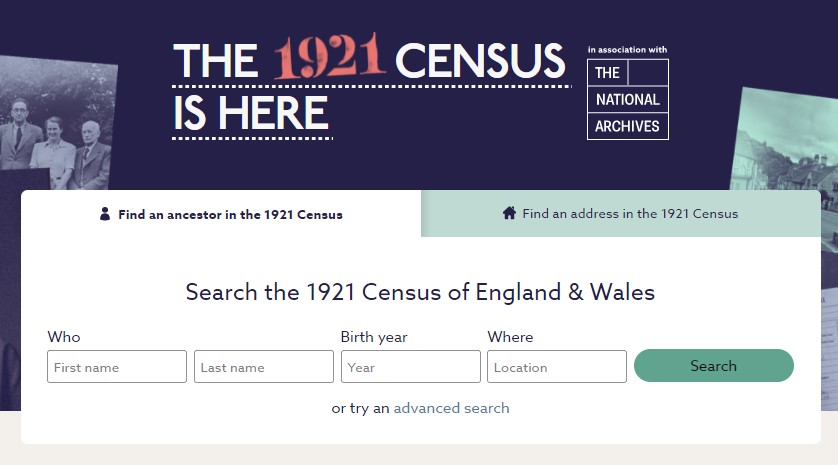
Note that when searching you are entering the year of birth, but the ‘Where’ field is not for place of birth. The ‘Where’ field is for you to enter the place in which you expect the person to be in 1921.
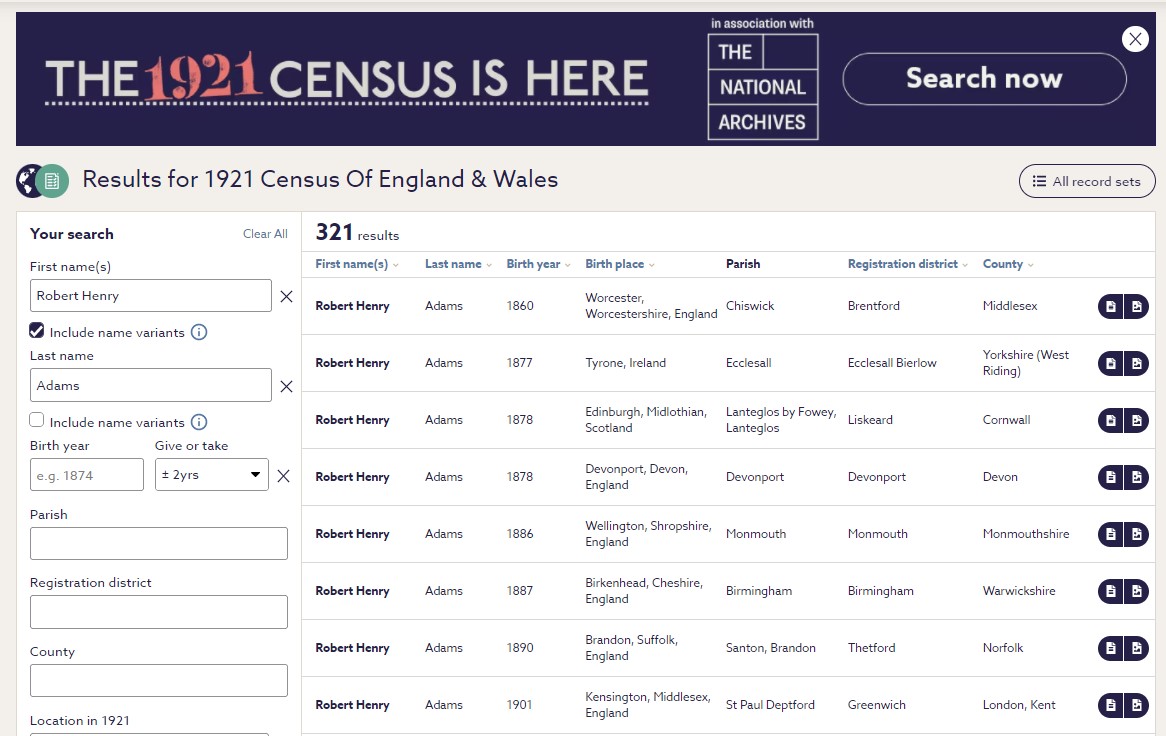
The search results give a detailed combination of facts to help you determine whether the entry is correct before you decide to buy a full transcription or the digitised image of the original page. This is an example of the search results above.
The details include: first name(s), last name, birth year, place of birth, and the name of the parish, registration district and county where the person was living in 1921.
How to do an advanced search of the 1921 Census on Findmypast
If our example above we searched for Robert Henry Adams, and there were 321 results. The advanced search provides numerous fields that you may use to narrow down your search results.
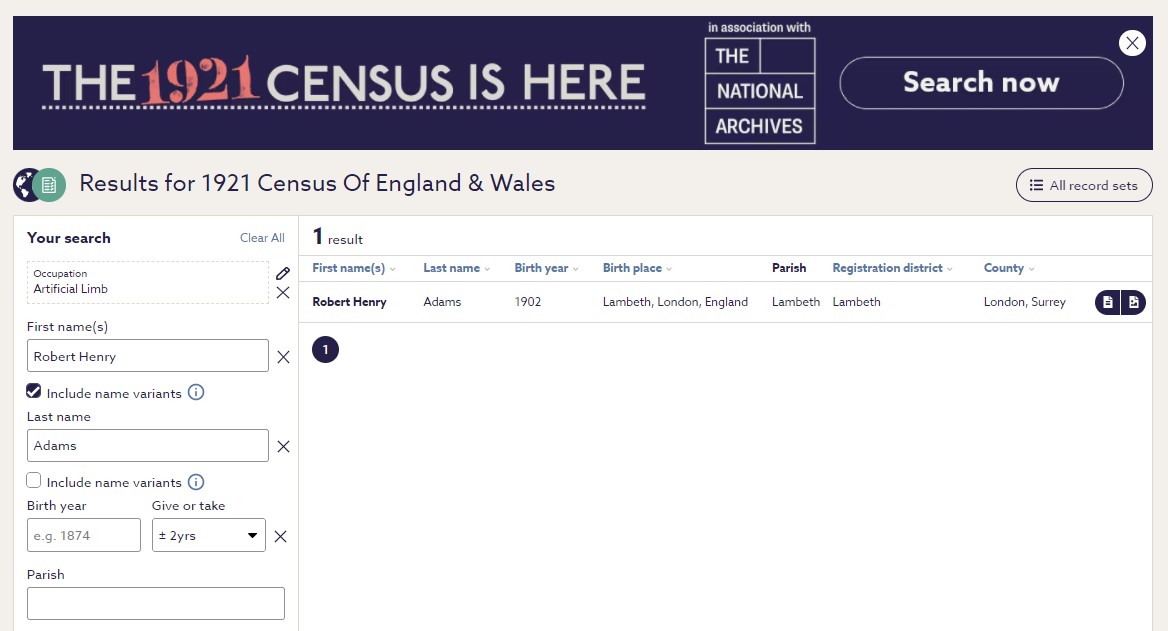
In this instance we have only included an occupation ‘artificial limb’ – and immediately we have cut the list down to just one result. The advanced search provides numerous ways in which you can make your list of search results more precise to your search interest.
To find out more, payment for the transcription or digitised image is required.
What you can see once you’ve paid for a 1921 Census record on Findmypast
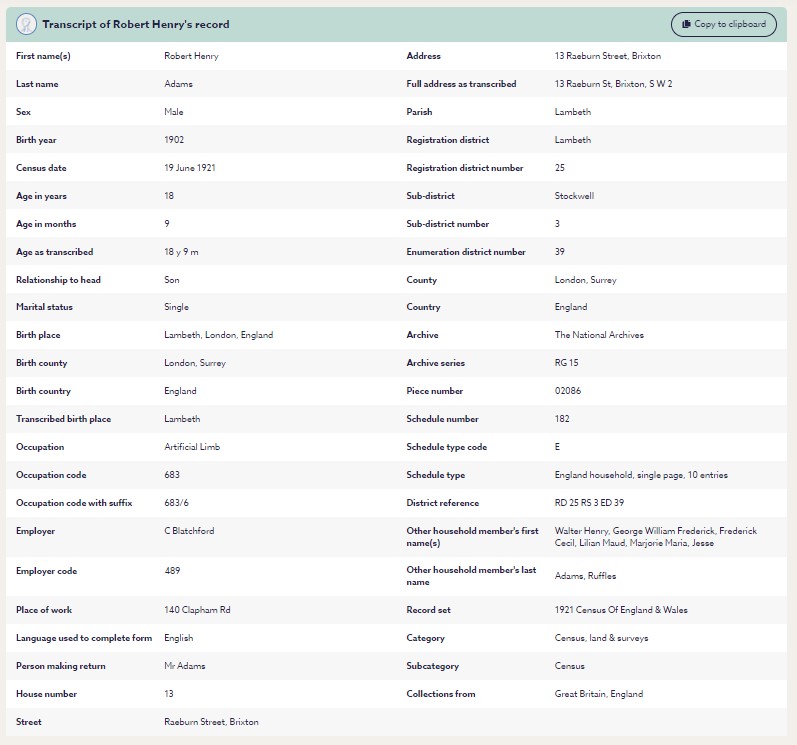
The details on the transcription for Robert Henry Adams, ‘artificial limb' maker, tell us that he was in the employment of C. Blatchford. Blatchford Prosthetics (www.blatchford.co.uk) is a Victorian company that is still in business today. In 1921 it is very likely that its clients included injured service personnel.
The prices are £2.50 to purchase the transcription and £3.50 for the digitised image (Pro subscribers to Findmypast have free access to the 1921 Census for England and Wales as part of their subscription (as of 11 October 2022); regular subscribers receive no discount).
It’s not just an image – it’s images
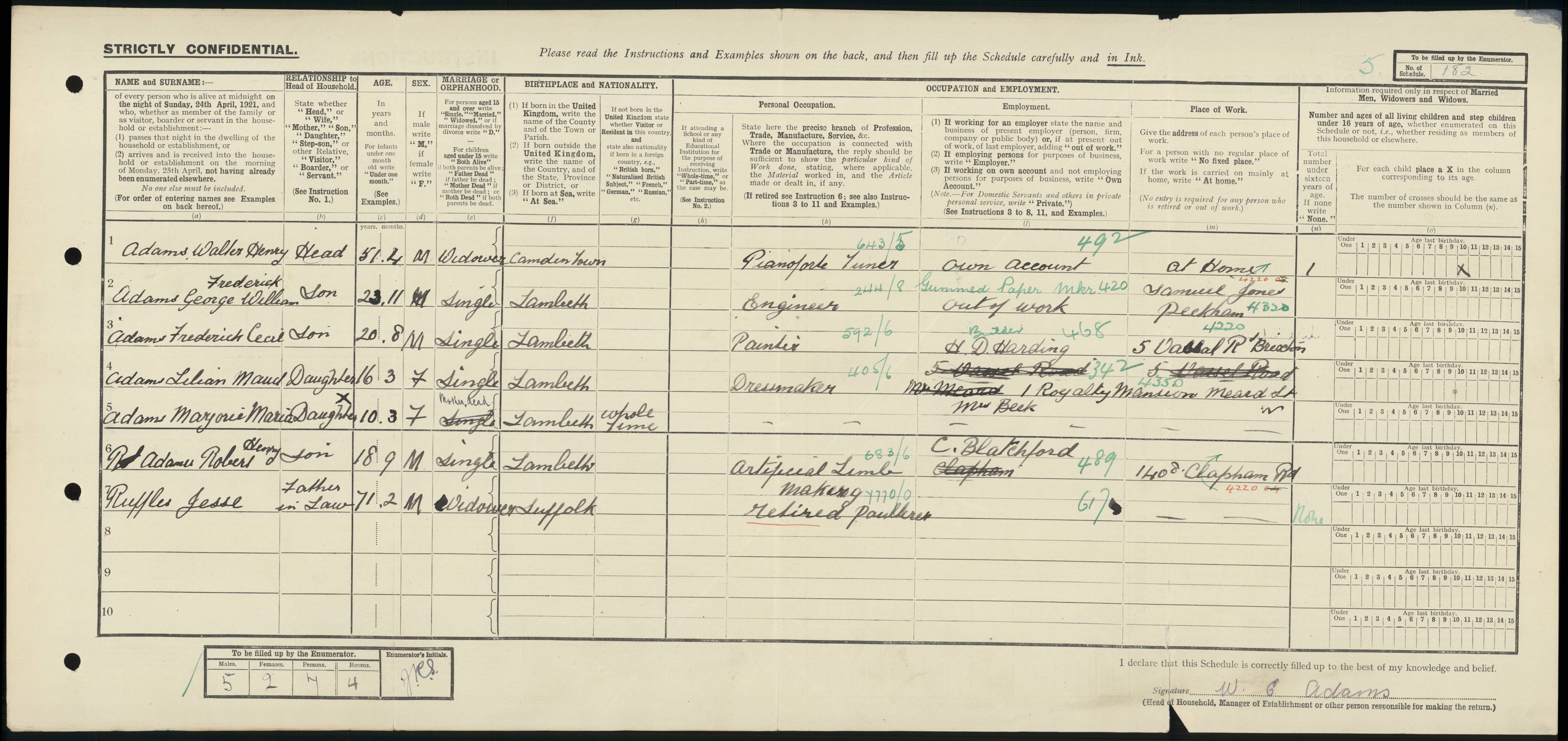
In addition to the household image, the £3.50 fee includes the front of the census form (on which you’ll find the address), the cover of the form (on which you will find the series and piece number), contemporary maps, details and plans of division (which comprise details similar to the enumerator’s description in earlier census returns). To find the image of the front and the image of the cover, whilst looking at the household image page click on ‘Extra (Address)’ – found near the bottom right-hand corner of the window.
Note: The address is found on the image of the front of the form, not on the household image page (which we are used to expect from the 1911 Census of England and Wales for instance).
How to do an address search on the 1921 Census on Findmypast
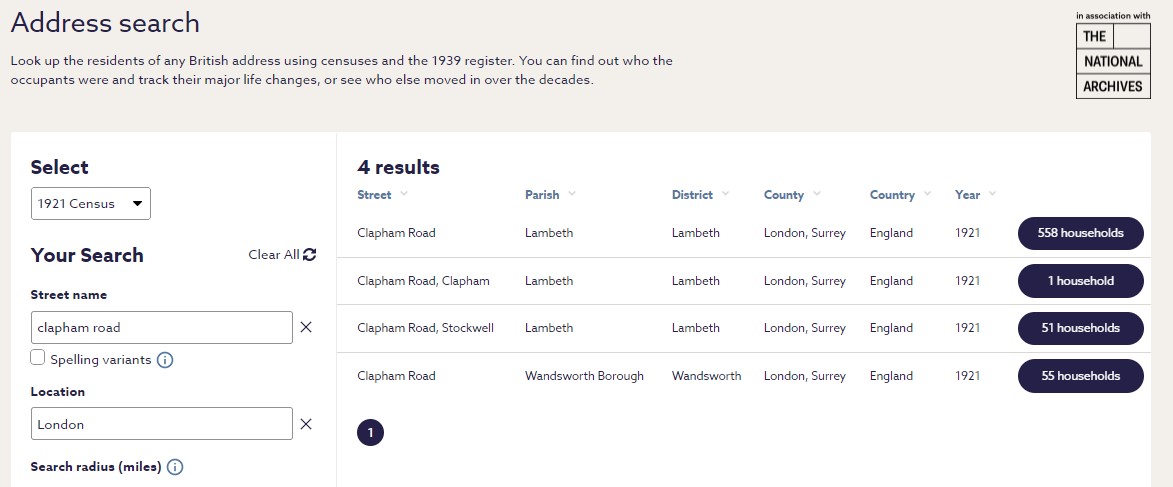
From the basic search, select the green tab to search by address.
Enter the street name and location.
From the list of search results, select a street and click through to reveal a list of house names or house numbers. This can be a useful way of determining how many households were living at an address. To find out more, payment for a transcription or image is required.
Note that the addresses you may search for in the 1921 Census of England and Wales include institutions, ships and places in the Isle of Man and the Channel Islands.
How to find the piece number for a 1921 Census record
The piece numbers can be located in a few ways:
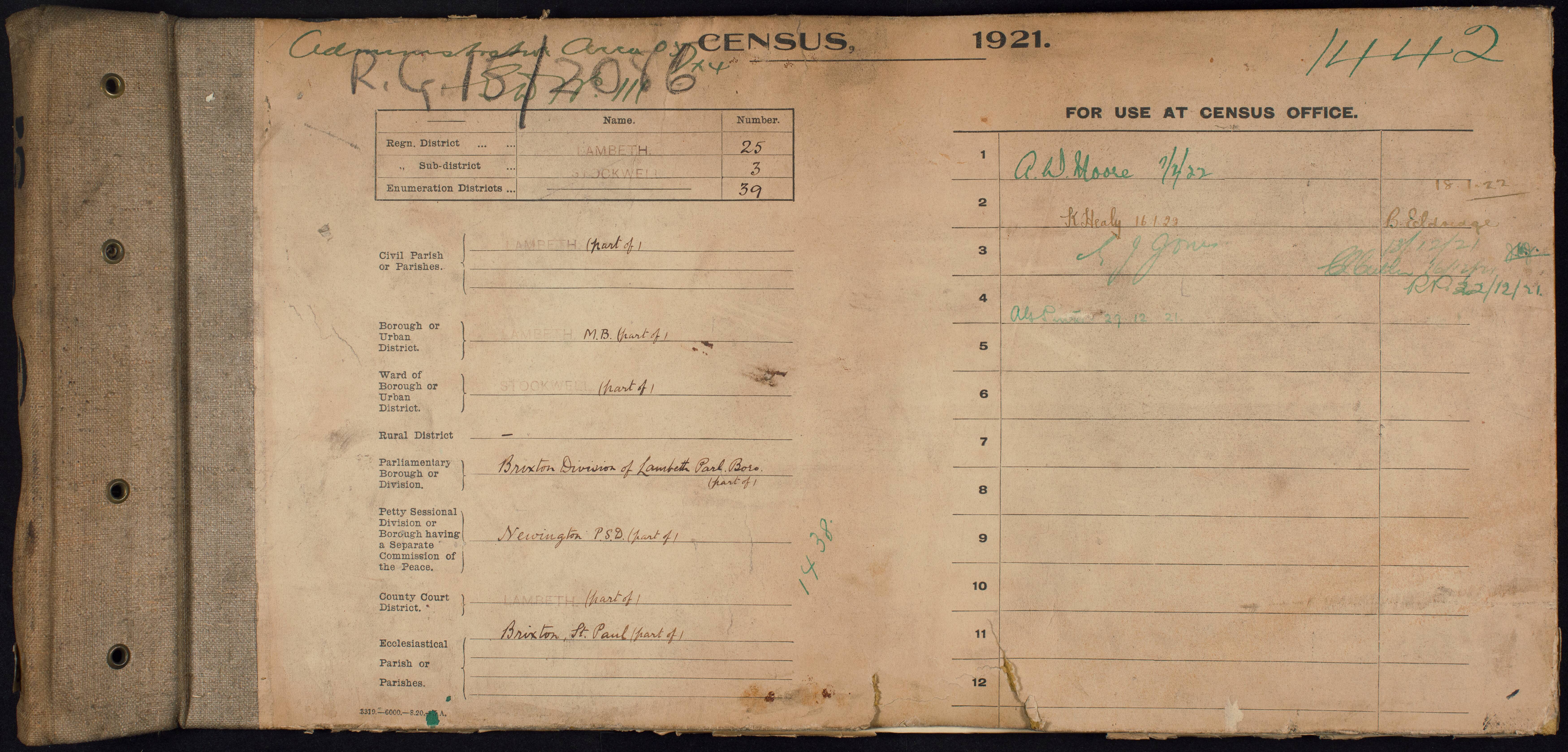
If you have bought a census image, you’ll find the piece numbers on the cover of the form (see above, scrawled in large handwriting RG15/2086) - and the piece number is also included in the file name of the image download.
If you’ve bought a transcription, you’ll find the piece number transcribed there.
How to create a census reference for a 1921 Census record
Use the piece number and add the household schedule number at the end.
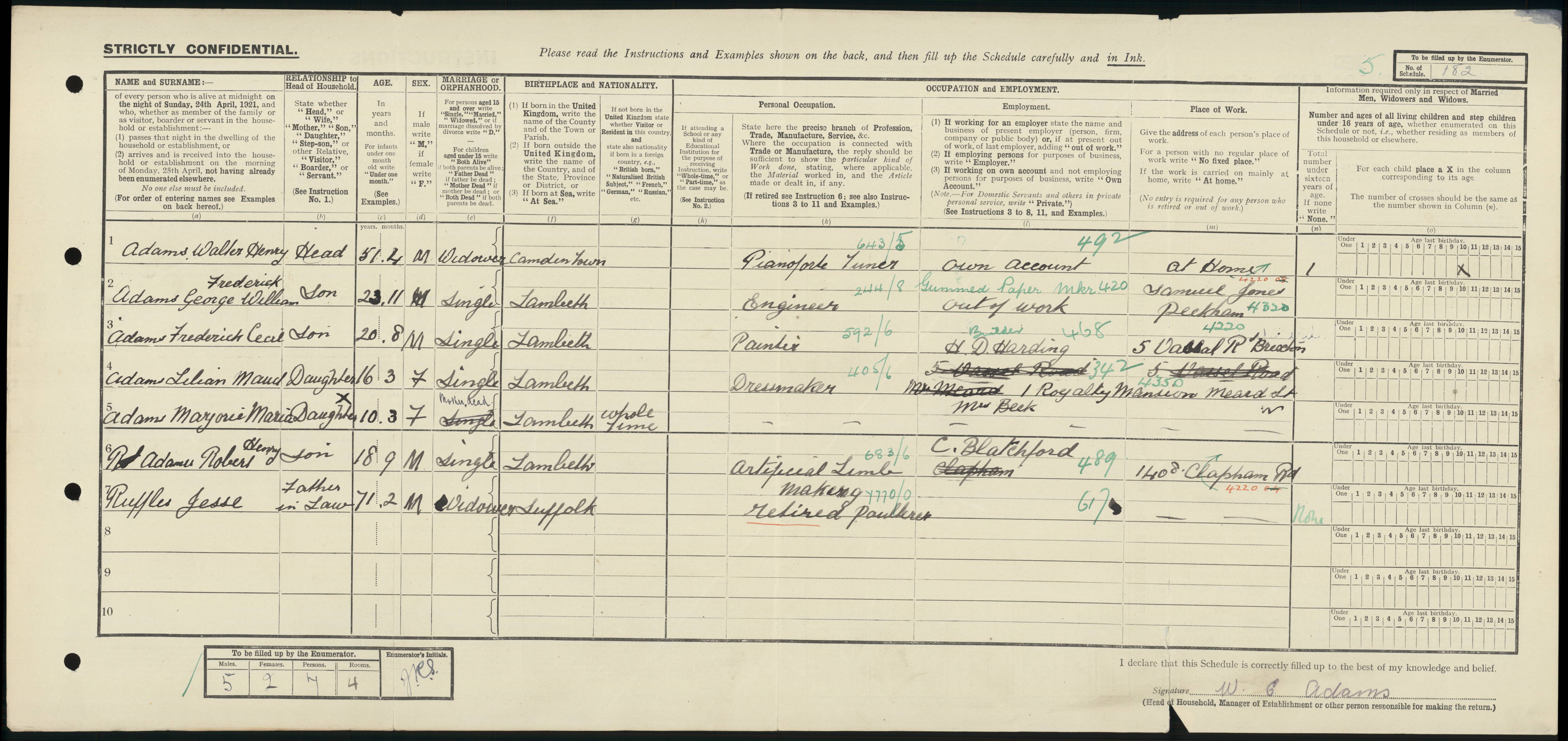
For census images you’ll find the household schedule number [No. of schedule.] in the top right-hand corner of the census household page. In this instance, it's 182.
For census transcriptions you’ll find the piece number and household schedule number included in the transcription.
How to search the 1921 Census on Ancestry
The easiest way to find the 1921 Census on Ancestry is to go to the card catalogue and search on '1921'. Here you can choose to search the collections for England, Wales, Channel Islands and Isle of Man. (At the moment the 1921 records are at the top of the list as they are newly added to Ancestry so you will not actually need to search for the collection).
How to use RD codes to help identify a place
For instance, you can use the Registration District and Sub-District code to work out a county name if this has not been included on your set of household census images.
Find a list of Registration District and Sub-District codes here.
Further reading
- Why was the 1921 Census for England & Wales postponed?
- Top five occupations at the time of the 1921 Census for England and Wales
- 1921 Census for England & Wales - fascinating facts
- Census unearthed: widows and orphans in 1921
Get more family tree advice with the Family Tree newsletter







